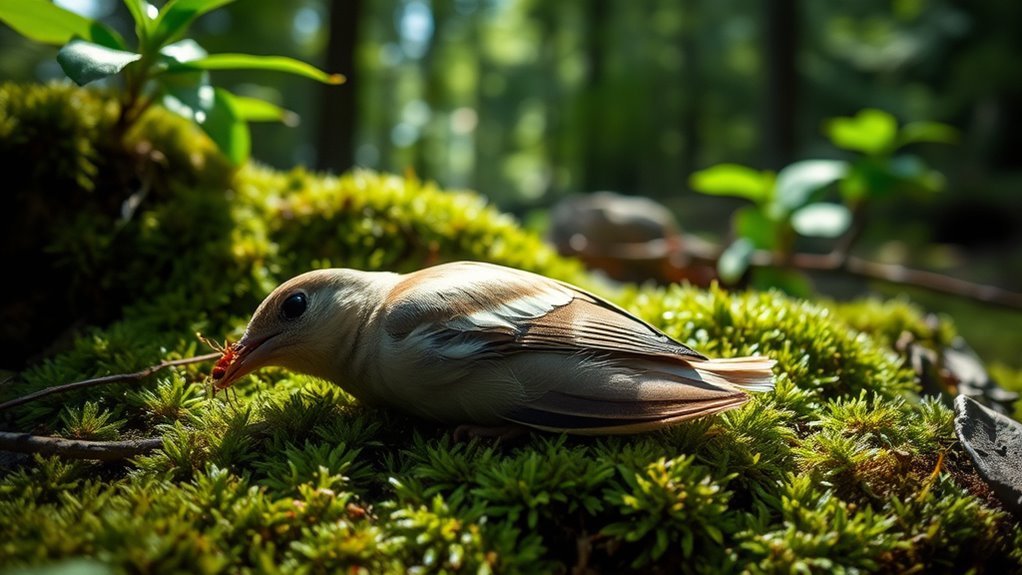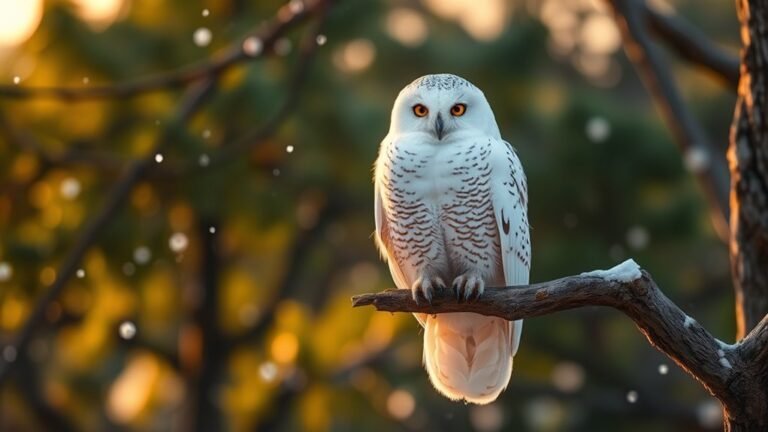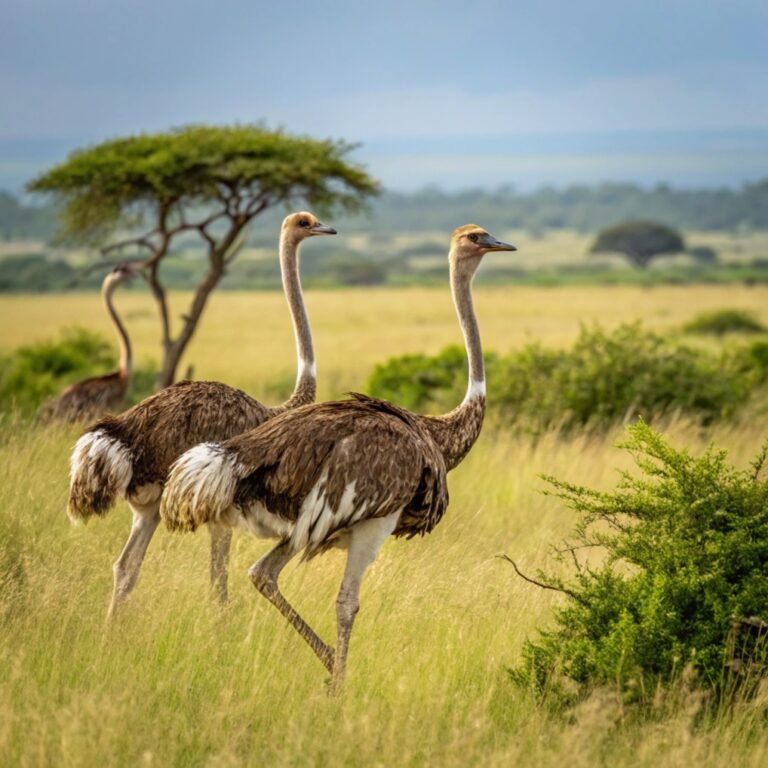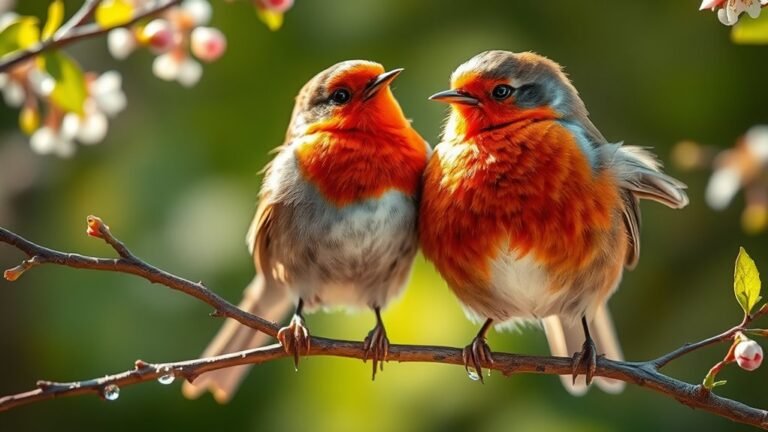What Does It Mean When You See a Dead Bird? Insights Revealed
When you see a dead bird, it may stir various feelings about life's temporary nature. This sight often carries deeper meanings in different cultures and personal beliefs. By looking into the symbolism of this encounter, you might discover insights about change and renewal. What does this moment say about your life and choices? This journey invites you to reflect on the significance of this experience.
Key Takeaways
- Seeing a dead bird often symbolizes the end of a cycle and encourages personal growth and letting go of old energies.
- Dead birds can signify impending change or loss, acting as a warning sign for misfortune in some cultures.
- Encounters with dead birds evoke deep emotions, prompting reflections on life, death, and the natural cycle of existence.
- Reflective practices, like writing or rituals, help process feelings associated with dead birds and commemorate their meaning.
- Sharing experiences with others fosters community healing and emphasizes the interconnectedness of life and nature's cycles.
The Symbolism of Birds in Various Cultures

Birds symbolize many things in different cultures. They can represent freedom, spirituality, death, and connection to the divine. Many cultures hold bird mythology in high regard, giving special meanings to different bird species.
For example, in Ancient Egypt, the falcon symbolized the sky god Horus. This bird stood for protection and power. In many Indigenous cultures, eagles are seen as symbols of strength and a link to the divine.
Birds also play important roles in art, literature, and rituals across cultures. They often act as messengers between the physical world and the spiritual one. Exploring these symbols helps us connect more deeply with shared human experiences.
Spiritual Meanings Associated With Dead Birds
Seeing a dead bird can stir strong feelings and prompt deep thought about its significance. Spiritually, dead birds often symbolize the end of a cycle or important life changes.
This death can indicate letting go of old energies and embracing personal growth. Many people believe that encountering a dead bird has spiritual meaning, leading you to reflect on your choices, relationships, and emotions.
This event may encourage self-examination and mindfulness, highlighting life's temporary nature. Recognizing these meanings can help you feel connected to a larger story, as many share similar feelings about change and renewal in nature's messages.
Common Beliefs and Superstitions

Many cultures view dead birds with distinct meanings, blending elements of fear, respect, and curiosity. These beliefs show how people relate to experiences in life.
- Seeing a dead bird may indicate a change or loss is coming.
- It's often seen as a warning of bad luck or misfortune.
- Some believe it carries a spiritual message, encouraging awareness of your environment.
- Others see it as a prompt to reflect on life and mortality.
Understanding these interpretations can offer insight into how different cultures perceive life and death.
Personal Interpretations and Emotional Reactions
Personal interpretations of dead birds reflect individual feelings shaped by culture and experiences.
Seeing a dead bird can bring feelings of loss or fear. It may prompt thoughts about mortality and personal development. This moment can support emotional healing, encouraging you to address hidden feelings or unresolved grief.
People have different views; some may see it as a sign of change while others view it as a warning. Journaling or talking about these feelings can strengthen connections with others.
Your reaction to a dead bird may provide insights into your emotions and the process of healing.
The Role of Birds in Ecosystems

Birds play a key role in ecosystems. They help keep the environment balanced through several important functions.
- Pollination: Birds assist in the reproduction of many plants, which provides food for various species.
- Seed Dispersion: Birds eat fruits and spread seeds across large areas. This promotes plant diversity and growth.
- Pest Control: Birds control insect populations. This prevents outbreaks that can harm crops and other animals.
- Nutrient Cycling: When birds die or leave droppings, they enrich the soil. This supports the overall health of ecosystems.
Recognizing these roles shows how crucial birds are for ecosystem balance.
Let's value their contribution and support efforts to protect them.
Signs of Change and Transformation
As ecosystems experience environmental stress, changes in bird populations become clear. Dead birds can signal shifts in their habitats. Events like climate change and urbanization impact migration, reproduction, and bird numbers.
Observing these changes helps people connect with nature and care for biodiversity. By recognizing these signs, you join others in understanding and addressing the challenges facing birds.
Getting involved with local groups can strengthen your voice in advocating for the environment. Together, you can explore how these changes reflect larger ecological patterns and develop a shared commitment to protect our natural world.
The Connection Between Life and Death
Observing a dead bird can bring sadness, but it also reveals important connections between life and death in ecosystems. This relationship highlights key life cycles and natural processes. Understanding these connections helps us feel part of the bigger ecological picture.
Here are some essential points to consider:
- Decomposition: This process breaks down dead matter, returning nutrients to the soil.
- Food Chain: Dead animals provide food for scavengers, keeping energy flowing in the ecosystem.
- Biodiversity: Healthy ecosystems have a variety of life forms, supporting interactions between species.
- Ecosystem Health: The presence of dead organisms can indicate environmental balance; a drop in species can disrupt this balance.
Recognizing these parts can deepen your understanding of the natural processes of life and death, connecting you to nature.
Mourning and Grief Reflections
Grief arises when we lose any living being, including birds. This response prompts reflection on our emotional ties to nature. Your expression of grief may differ based on the importance these creatures had in your life.
Participating in mourning practices, such as lighting a candle or observing a moment of silence, can assist you in processing your feelings. Studies indicate that these rituals build a sense of community among those who share similar losses.
The Scientific Perspective on Dead Birds
Dead birds can reveal important information about the environment. They act as indicators of ecosystem health and highlight issues that could impact other species. By studying these incidents, scientists can discover threats to bird populations and the ecosystem.
Here are key factors to consider:
- Pollution: Harmful substances can lower breeding and survival rates of birds.
- Habitat Loss: Changes in land use can reduce food sources for birds.
- Diseases: Certain pathogens can endanger local bird populations.
- Climate Change: This can affect migration routes and the types of habitats available.
Understanding these factors helps you grasp the connection between wildlife and environmental health. It also reminds us how our actions can influence nature.
Historical Context of Bird Symbolism
Birds hold important cultural and symbolic meanings in many societies. They often reflect how humans relate to nature. Bird folklore helps us understand the symbols associated with these creatures. Different cultures link birds to themes like freedom, transformation, and spiritual guidance.
For example, ancient Egyptians saw the ibis as a symbol of wisdom and divinity. In many indigenous cultures, the eagle represents power and a connection to the spiritual world. Each bird's unique traits influence its symbolic meaning.
These meanings shape our beliefs and behaviors. By studying bird symbolism, we gain insight into human experiences and cultural values throughout history.
Messages and Lessons From Nature
Nature offers clear messages and lessons that relate to human life. By observing nature, you can gain useful insights:
- Change is constant: Life, like the seasons, always changes.
- Life and death coexist: Accepting this fact brings peace.
- Resilience is key: Nature's recovery shows our strength.
- Connection matters: Understanding your role in nature fosters belonging.
These insights remind us of the importance of adaptation, acceptance, resilience, and connection in our lives.
Engaging with nature can inspire personal growth and improve well-being.
How to Honor and Reflect on the Encounter
Encounters with wildlife, such as finding a dead bird, can stir deep feelings. When this happens, you can honor the bird's memory through simple reflective practices. Start by writing down your thoughts and emotions about the encounter. Note any meanings or messages you feel it may carry. This helps you process your feelings and strengthens your bond with nature.
You can also create a small ritual for remembrance. Light a candle or plant a flower in honor of the bird. These actions serve as a tribute and help you remember its life.
Sharing your experience with friends or family can build a sense of community and promote shared reflection. By engaging in these practices, you can find closure and appreciate the natural cycle of life.
These moments can enrich your everyday experiences, bringing deeper meaning to your interactions with the world around you.
Frequently Asked Questions
Can Dead Birds Predict Upcoming Events or Changes in My Life?
Dead birds often symbolize change. They can signal upcoming events in your life. You might interpret these signs as opportunities for personal growth. Pay attention to your feelings and thoughts when you see a dead bird. Trust your intuition. This can help you understand what changes may arise. Embrace transformation with an open mind.
How Do Different Cultures Explain the Death of a Bird?
Different cultures see bird symbolism in their own ways. Many cultures attach special meaning to a bird's death. Some people believe a dead bird brings a message from the spirit world. Others think it signals bad luck or warns of trouble. These beliefs reflect the values and traditions of each culture, showing how deeply they connect with nature and life.
What Should I Do if I Find a Dead Bird?
If you find a dead bird, first, stay calm. Check for signs of pollution or illness in the area. Next, inform local wildlife authorities. They can manage the situation properly and help raise awareness about environmental health. Your action contributes to community safety and awareness.
Are There Health Risks Associated With Touching Dead Birds?
Touching dead birds can transmit diseases and pose contamination risks. You may come into contact with harmful germs. To protect yourself, wear gloves and wash your hands thoroughly afterward. Your health and safety should always be your main concern in these situations.
Do Particular Bird Species Hold Different Meanings When Found Dead?
Different bird species have specific meanings and symbols. When you see a dead bird, it can prompt thoughts and questions. You can investigate the cultural significance and personal connections related to that bird in various traditions. Each bird can represent different emotions or messages depending on the context and background. Exploring these meanings can provide insights into your own life and experiences.

Hello, I’m Emily Price, the founder of Birds Affection. As a passionate bird enthusiast and spiritual seeker, I’ve always been fascinated by the symbolic meanings and mystical connections between birds and our lives. On this website, I share my knowledge and insights on the spiritual significance of various bird species, exploring their roles as messengers, guides, and teachers. Through my writing, I aim to inspire and educate others on the profound wisdom and beauty that birds bring to our world. Join me on this journey as we delve into the enchanting realm of bird symbolism and discover the hidden meanings behind these magnificent creatures.







